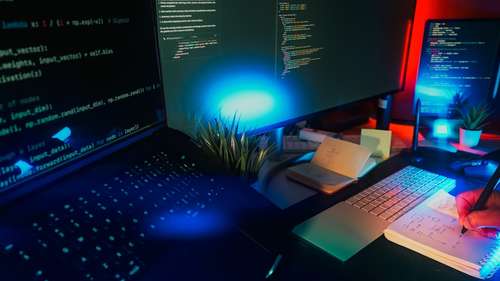Jordi Van Den Bussche, popular as Kwebbelkop in the gaming community, has made a groundbreaking move in the digital creator space.
After struggling with burnout, he utilises AI technology to replicate his on-screen persona for video production. This shift poses questions about the reception of an AI-based replacement for content creation.
For years, Van Den Bussche poured his heart and soul into his YouTube channel, tirelessly churning out content, seeking brand collaborations, and managing the multifaceted demands of the platform. Yet, the relentless cycle left him drained and devoid of personal time.
Reflecting on this relentless grind, he acknowledges, “Every time I wanted a break, my entire business would halt.”
In 2018, grappling with severe burnout, he confronted the inherent flaw in the creator-centric model. The industry seemed to revolve around a singular individual, vulnerable to exhaustion or other limitations.
This realization prompted him to rethink the dynamics of digital stardom. His vision is an AI-driven system to perpetuate his brand even without his direct involvement.
“I'm retired from being an influencer,” he asserts. “I want to take things to the next level and make this brand live on forever.”
Unveiling the AI Influencer Platform
Recently unveiled, Van Den Bussche’s AI influencer platform introduces innovative AI tools, one mimicking his on-camera presence to generate new content.
Like established AI technologies like Forever Voices and QuickVid, these tools aim to streamline content creation by replicating his mannerisms and speech patterns.

Jordi Van Den Bussche | Kwebbelkop/YouTube
While tight-lipped about the specifics of AI's development, Van Den Bussche emphasizes the role these tools play at a time when generative AI impacts work dynamics.
His initiative holds substantial implications not only for YouTube creators but also for the broader creative niche.
AI's Impact on Content Creation and Industry Evolution
Preceding the AI development, Van Den Bussche coached aspiring influencers, revealing the flaws of an industry hinging solely on human input.
Looking deeper, his team researched the elements driving creator success, culminating in the birth of Bloo, a virtual YouTuber powered by AI.
The debut of AI-generated Kwebbelkop videos marks a shift. Emphasizing that he's not retiring as a creative, Van Den Bussche embraces AI as a substitute for his creative role.
Confident in the AI's ability to replicate creativity, he's optimistic about its potential, backed by initial success and a growing interest from industry peers.
The Audience Reception Challenge
However, industry experts like Lia Haberman disagree about the seamless acceptance of AI-generated creators. Haberman highlights the unique appeal of human creators, fostering relationships and relatability with audiences—a quality that AI might struggle to replicate.
While acknowledging the potential for entertainment, she sees virtual influencers as distinct from sentient beings.
Nonetheless, Van Den Bussche foresees his AI initiative as a solution for creators confronting burnout, aiming to sustain their brands without succumbing to the pressures that often lead to retirement.
Impact of AI YouTube Video Creators on Future Creators
The introduction of AI-driven content creation presents a novel option for creators to perpetuate their brand indefinitely, potentially bypassing the limitations associated with human creators.
Van Den Bussche's bold step signifies a transformative shift in the creator economy, aiming to alleviate the strains that have led many influencers to exit the digital sphere.
As AI technology evolves and adoption becomes more widespread, the implications on the creators remain to be seen. The audience's willingness to embrace AI-generated content as a replacement for the familiar human touch is the key.




